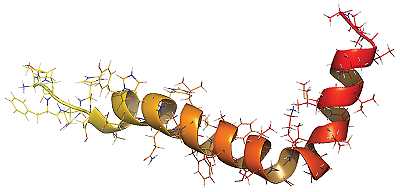The notion that antidepressants can prevent Alzheimer’s disease sounds almost too good to be true. Yet some animal work and human pilot research suggest that this is a possibility.
In research headed by Yvette Sheline, M.D., a professor of psychiatry at the University of Pennsylvania, tiny probes were implanted in the brain memory centers—the hippocampi—of mice modeled to have Alzheimer’s. Some of the mice were given the SSRI antidepressant citalopram in 2.5 mg/kg doses, others in 5 mg/kg doses, and still others in 10 mg/kg doses. Fluid from their hippocampi was drawn before antidepressant administration and 24 hours after to measure the levels of beta-amyloid—a hallmark of Alzheimer’s disease—in that brain region. The results were published May 14 in Science Translational Medicine.
There was no change in the levels of beta-amyloid in the mice that had been given the 2.5 mg/kg doses. But there were significantly lower levels in the mice that had been given the 5 mg/kg or the 10 mg/kg doses. The 10 mg dose is comparable to 50 mg/day in humans—a “common, though high, dose of citalopram prescribed to treat depression,” the researchers noted.
The researchers then gave mice modeled to have Alzheimer’s either 10 mg/kg of citalopram or a placebo for 28 days. The animals’ brains were imaged before and after antidepressant or placebo administration to determine the number of beta-amyloid plaques present.
Antidepressant treatment reduced the number of newly appearing plaques significantly more than placebo treatment did. Moreover, the rate of growth in existing plaques was significantly less in the antidepressant group than in the placebo group.
Finally, the researchers gave 23 human volunteers aged 18 to 50 with no medical disease or history of antidepressant use either a 50 mg dose of citalopram or a placebo, then took cerebrospinal fluid samples from each volunteer before, during, and up to 45 hours after treatment to assess levels of beta-amyloid in the two groups.
Beta-amyloid production in the cerebrospinal fluid was slowed by 37 percent in the citalopram group compared with the placebo group. This change was associated with a 38 percent decrease in total cerebrospinal fluid concentration in the antidepressant group.
“The ability to decrease central nervous system beta-amyloid concentrations is thus potentially important as a preventive strategy for Alzheimer’s disease,” Sheline and her colleagues said in their report.
“It has to be emphasized that these were not clinical studies and that no treatment recommendations can be based on these preliminary reports,” Joel Yager, M.D., a professor of psychiatry at the University of Colorado and chair of the APA Council on Quality Care, said in an interview with Psychiatric News. “Additional studies will be required to see whether reductions in beta-amyloid production in fact persist with long-term SSRI treatment in humans, and whether reduced production might actually result in clinically meaningful reductions in plaque formation and cognitive impairment. In addition, studies will have to consider potential adverse effects of long-term chronic SSRI treatments in the elderly. All that said, these results might suggest preventive strategies for future practice,” particularly in those at high risk for Alzheimer’s disease, he noted.
The study was funded by the National Institutes of Health, the Washington University Hope Center for Neurological Diseases, and the Washington University Biomedical Mass Spectrometry Resource. ■
An abstract of “An Antidepressant Decreases CSF Beta-Amyloid Production in Healthy Individuals and in Transgenic Alzheimer’s Mice” can be accessed
here.

